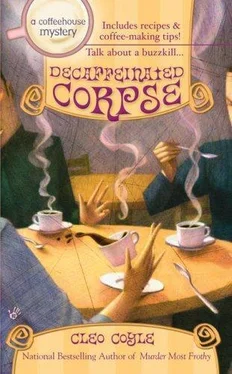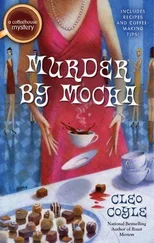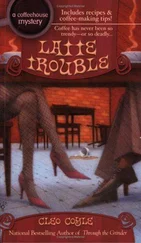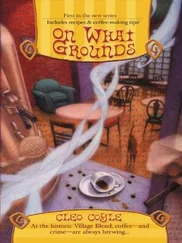Клео Коул - Decaffeinated Corpse
Здесь есть возможность читать онлайн «Клео Коул - Decaffeinated Corpse» весь текст электронной книги совершенно бесплатно (целиком полную версию без сокращений). В некоторых случаях можно слушать аудио, скачать через торрент в формате fb2 и присутствует краткое содержание. Год выпуска: 2007, ISBN: 2007, Издательство: Berkley, Жанр: Детектив, на английском языке. Описание произведения, (предисловие) а так же отзывы посетителей доступны на портале библиотеки ЛибКат.
- Название:Decaffeinated Corpse
- Автор:
- Издательство:Berkley
- Жанр:
- Год:2007
- ISBN:978-1-436-25369-7
- Рейтинг книги:5 / 5. Голосов: 1
-
Избранное:Добавить в избранное
- Отзывы:
-
Ваша оценка:
- 100
- 1
- 2
- 3
- 4
- 5
Decaffeinated Corpse: краткое содержание, описание и аннотация
Предлагаем к чтению аннотацию, описание, краткое содержание или предисловие (зависит от того, что написал сам автор книги «Decaffeinated Corpse»). Если вы не нашли необходимую информацию о книге — напишите в комментариях, мы постараемся отыскать её.
Decaffeinated Corpse — читать онлайн бесплатно полную книгу (весь текст) целиком
Ниже представлен текст книги, разбитый по страницам. Система сохранения места последней прочитанной страницы, позволяет с удобством читать онлайн бесплатно книгу «Decaffeinated Corpse», без необходимости каждый раз заново искать на чём Вы остановились. Поставьте закладку, и сможете в любой момент перейти на страницу, на которой закончили чтение.
Интервал:
Закладка:
Ric laughed.
“What’s funny?”
“You Americans watch too many crime shows. I’ve been counting them up on my hotel room’s telly: true crime, fake crime, funny crime, scary crime... supernatural,mathematical, and neurotic. Twenty-four hours a day on U.S. TV, you can see someone getting killed twenty-four different ways.”
“You’re saying I’m a paranoid American?”
“I know you mean well, love. But nobody is trying to kill me. I know what the mugger wanted.”
“What?”
“The cutting. I’m sure of it. So is Matt.”
“Cutting?” I blinked. “What cutting?”
“It’s the reason Matt and I don’t want the police involved. We did something... how shall I put it? Not quite legal...”
Oh, lord. Mike was right. “What? What did you two do?”
“We smuggled a cutting of my hybrid arabica into the country.”
“You what ?”
“It was quite cleverly done, actually. A few weeks ago, I shipped it to Matt overnight, hidden inside a specially lined statue of Saint Joseph, which Matt broke open.”
“He broke a religious statue?” I frowned. “That’s bad luck.”
Ric laughed. “Little Clare... you’re as adorable as I remember.”
“I thought you said I’ve changed, that I’m more ‘head-strong’ than you remember?” I made little air quotes around the word to remind him.
Ric shrugged. “You’re that, too.” He sipped his decaf. “And you still make heavenly coffee.”
And you’re still as smooth a charmer as ever.
The man was as attractive as ever, too. The rugged shadow of his beard framed a dazzling smile, dark chest hairs peeked out between the lapels of Matt’s white terrycloth bathrobe, and the man’s big, brown long-lashed eyes looked just as sleepy and bedroomy as I remembered.
But ten years was a long chunk of time. It had been enough to change things about me. I wondered what it had changed about Ric.
When I’d first met him, he’d been a laid back foreign exchange student. Although he’d been interested in his studies, he’d never appeared especially committed. I still remember him sauntering into the Blend for wake-up espressos at eleven o’clock, having missed an early lecture because of partying too late the evening before.
As far as I knew, the Gostwicks’ highly profitable coffee farm had let Ric live the life of a carioca, a Brazilian term for a guy who preferred to spend his days hanging out at the beach, looking good, eating, drinking, and making love to whatever female admirers happened by. (I’d learned the word from Matt, who probably qualified as one since Rio’s Ipanema Beach—i.e. “ Carioca Central”—was pretty much his South of the Equator headquarters.)
I wondered what had changed Ric Gostwick. Obviously, something had pushed him into hunkering down and focusing on the coffee business so intensely he’d achieved a botanical breakthrough that others had been diligently striving and failing to accomplish for years. I also wanted to know why he was in such a hurry to get the cutting into the country.
“You really shouldn’t have broken the law,” I told him. “I don’t understand why—”
“Getting a live plant into this country is full of government red tape, that’s why,” Ric countered. “Any plant parts intended for growing require a phytosanitary certification in advance from your United States Department of Agriculture.”
“There’s a reason for that.”
“Yes, I know. Worries about the spread of pests and disease. But I can assure you the cutting is pristine.”
“If you’re caught, the fines are astronomical. I can’t believe you took the risk!”
“It would have been a bigger risk to do it openly. They might have turned down the application, or worse, its inspection process could have gotten it stolen.”
I might have argued that his worries were pure paranoia, but it would have been a tough sell. Historically, the only reasons coffee had become a global cash crop were because of theft and smuggling.
Ethiopians might have been the first to discover the plant growing wild in their country, but Arabs were the ones who first exported it. For years they held the monopoly on its cultivation. Foreigners were forbidden from visiting coffee farms, and the beans would be sent to other parts of the world only after their germinating potential was destroyed through heating or boiling.
Around 1600, a Muslim pilgrim from India smuggled the first germinating seeds from Mecca to southern India. Soon after, Dutch spies smuggled coffee plants to Holland from Mocha. (Mocha being the principal port of Yemen’s capital Sana’a, hence the naming of Arabian Mocha Sanani , coffee beans world-renowned for their powerfully pungent flavor, with notes of wine, exotic spices, and cocoa.)
After the Dutch got hold of the plant, they began cultivating coffee in their colonies: Ceylon (now Sri Lanka), Sumatra, Bali, Timor, Dutch Guiana (now Suriname), and eventually Java.
But the larceny didn’t end there. A coffee plant was shipped from Java to Holland for its Botanical Garden, and a number of visiting dignitaries were given cuttings as gifts. The mayor of Amsterdam made the mistake of giving Louis XIV of France the gift of a coffee cutting from this Java tree.
In Paris, King Louis put the coffee cutting under guard inside his famous Jardin des Plantes, Europe’s first greenhouse, where it was cultivated into seedlings. A French naval captain, eager to sever France’s dependence on the high-priced coffees of Dutch-controlled East India, stole a seedling and sailed it to Martinique, where its offspring allowed France to grow its own coffee.
And my former mother-in-law’s favorite legend was the one in which a coffee cutting was smuggled to Brazil in a bouquet of flowers. The flowers were given to a dashing Brazilian diplomat by the smitten wife of French Guiana’s governor. If the story is true, Brazil’s billion-dollar coffee trade apparently sprang from an extramarital love affair and that single smuggled cutting bearing fertile cherries.
Given coffee’s volatile past, I knew it wasn’t a stretch for Ric to be concerned about the theft of his cutting, so I held my tongue.
“Matt and I agreed we couldn’t take any chances,” Ric said, “not until it’s been properly patented.”
“Patented.” I blinked in confusion. “You can patent a plant? I didn’t think you could do that.”
Ric nodded. “It’s possible, according to Ellie.”
“Ellie?” It had been well over ten years, but I quickly recognized the name, especially when it was linked to Federico Gostwick. “Ellie Shaw?”
Ric sipped his decaf and nodded. “It’s Lassiter now. She agreed to help me.”
“Help you... how?”
“I never finished my BS in botany. Ellie did. She even went on to get a masters from Cornell with a focus on public garden management. In horticultural circles, she’s known and respected, and she’s familiar with the process of applying for a plant patent. One of her old professors is on the PVPO advisory board. So she agreed to help me secure it.”
“PVPO?”
“Plant Variety Protection Office. It’s part of your Department of Agriculture.”
“But why not just apply in Brazil? Don’t you have patent lawyers there?”
“Of course, but there are...” Ric shrugged— “complicating issues. Matt and I both agreed that the U.S. patent would solve our problems.”
“Problems? I don’t follow you. What problems?”
“Really, Clare, you shouldn’t worry about this. Matt and I have made our deal. Next week we’ll announce it, along with my breakthrough, and then we can all just sit back and get rich, eh? You don’t have to—”
Читать дальшеИнтервал:
Закладка:
Похожие книги на «Decaffeinated Corpse»
Представляем Вашему вниманию похожие книги на «Decaffeinated Corpse» списком для выбора. Мы отобрали схожую по названию и смыслу литературу в надежде предоставить читателям больше вариантов отыскать новые, интересные, ещё непрочитанные произведения.
Обсуждение, отзывы о книге «Decaffeinated Corpse» и просто собственные мнения читателей. Оставьте ваши комментарии, напишите, что Вы думаете о произведении, его смысле или главных героях. Укажите что конкретно понравилось, а что нет, и почему Вы так считаете.












